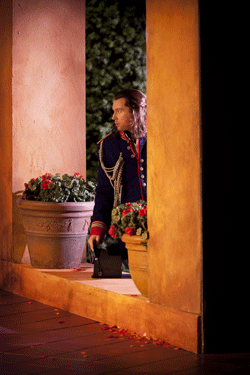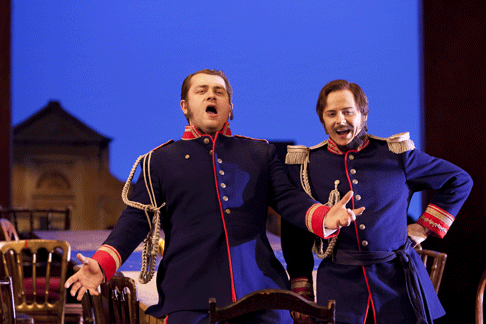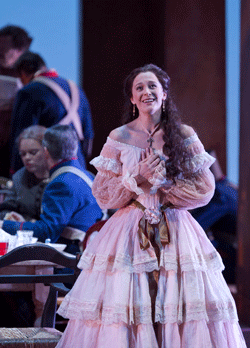Throughout his career Berlioz had a rather distinctive way with the form of
a piece, so it is perhaps inevitable that an opÈra comique written by
him would not be straightforward. Beatrice and Benedict is his final
dramatic work, a piece that is small scale partly because Berlioz’s health
would not allow him to write anything bigger and partly because that was what
was suitable for a summer entertainment at the spa of Baden-Baden. Stagings of
the piece are relatively rare so it was with great pleasure that I anticipated
WNO’s performance of the opera, doubly so as it was to be a revival of Elijah
Moshinsky’s 1994 production, beautifully designed by Michael Yeargan (sets)
and Dona Granata (costumes).
 Robin Tritschler as Benedict
Robin Tritschler as Benedict
The work was performed in English with spoken dialogue adapted from
Shakespeare’s play by Elijah Moshinsky and revival director Robin Tebbutt.
Now the British, as a rule, are not very good at opÈra comique,
something awful seems to happen when the works cross the channel — Offenbach
turns into G & S and anything more serious gets just plain embarrassing.
Recent performances of the opera in London have tended to be concerts, in which
the dialogue was either spoken by actors or replaced by a spoken narration,
neither solution very satisfactory. With Beatrice and Benedict the
problem is worse because people insist on trying to turn the piece back into a
musical version of Much Ado About Nothing rather than sticking with a
French opÈra comique. In Cardiff we had dialogue cut to the bone, but
spoken in a language which veered awkwardly between direct quotation from
Shakespeare and more modern idiom.
I had heard wonderful reports of the original 1994 production Elijah
Moshinsky production, but somehow the magic does not seems to have survived.
The set looked lovely, ravishing in fact, with Paul Woodfield now in charge of
Howard Harrison’s original lighting plot. But the set was designed for the
far smaller stage of the New Theatre in Cardiff. And its rigidly architectural
form meant that not only did the set look narrow, but sight lines were not
ideal; it is a shame that somehow it could not have been opened up somewhat.
The setting was 19th century Sicily, with the ladies in big crinoline dresses
and an architectural loggia doing admirable service for all scenes in
the opera.
Musically we got off to a good start with a sparkling account of the
overture under Michael Hofstetter. The spoken dialogue got off to a bad start
with Michael Clifton-Thompson’s Leonato having to deliver his lines with his
back to the audience.
 Gary Griffiths as Claudio and Piotr Lempa as Don Pedro
Gary Griffiths as Claudio and Piotr Lempa as Don Pedro
Sarah Fulgoni’s Beatrice looked lovely and she spoke her dialogue quite
aptly. But there was something of a mis-match between her nice, well-modulated
speaking voice and the incredibly richly upholstered tones of her mezzo-soprano
voice. Here was a Beatrice who, though intelligent and musical, simply failed
to sound like the sharp-witted Beatrice that we expect. There were moments of
great beauty, particularly in Beatrice’s long solo in Act 2 when she comes to
accept that she loves Benedict, but the as a whole the character failed to take
off. Perhaps, this is partly because there was simply too little spark between
Fulgoni and Robin Tritschler’s Benedict.
If Fulgoni’s voice seemed overly rich for her role, Tritschler’s lyric
tenor seemed in danger of being too light for Benedict. Under pressure his
voice seemed to turn a trifle too reedy and you wondered whether this was ideal
repertoire for him. He encompassed Benedict’s solos melodiously and was and
entirely willing and capable actor. But the essential spark was not there, his
relationship with Beatrice just didn’t crackle with energy the way it
should.
Both Fulgoni and Tritschler were entirely capable, but unfortunately Donald
Maxwell as Somarone gave us an object lesson in how to take control of the
stage whether speaking or singing. Somarone the learned music master can be a
rather tedious character and Maxwell did rather over do things by including
topical references into his speeches. But as a demonstration of how to capture
the attention of an audience, he could not be faulted.
 Laura Mitchell as Hero
Laura Mitchell as Hero
Laura Mitchell and Gary Griffiths played Hero and Claudio. Unfortunately in
the opera Claudio is reduced to a cipher and as there is no one to impede their
love, Hero has only to be delightfully in love. This Mitchell did beautifully,
looking and sounding ravishing. She and Anna Burford as Ursula brought Act 1 to
a ravishing close with their duet; one of the moments when music, drama and
visuals came together in a moment of perfection which gave a hint at the
pleasure the production must have given when new.
The role of Don Pedro is musically very small, but the character is quite a
player in the spoken dialogue; Piotr Lempa, the only non-native English speaker
in the cast, coped brilliantly nevertheless.
Under Michael Hofstetter the orchestra gave a sympathetic account of
Berlioz’s score. Hofstetter’s biography in the programme book described him
as a baroque specialist though he seems to have been venturing into wider water
recently, with productions including Tristan und Isolde, and conducted
Beatrice and Benedict at Houston Grand Opera in 2008.
This was one of the evenings in the theatre which does not quite catch fire,
though nothing really goes wrong either. As Beatrice and Benedict is
revived so rarely, I did so want it to be so much more; that said there were
many incidental beauties along the way.
Robert Hugill
Click here for a photo gallery of this production.
image=http://www.operatoday.com/BB_WNO_14.gif
image_description=Sara Fulgoni as Beatrice [Photo by Johan Persson courtesy of Welsh National Opera]
product=yes
product_title=Hector Berlioz: Beatrice and Benedict
product_by=Beatrice: Sara Fulgoni; Benedict: Robin Tritschler; Don Pedro: Piotr Lempa; Leonato: Michael Clifton-Thompson; Hero: Laura Mitchell; Claudio: Gary Griffiths; Ursula: Anna Burford; Somarone: Donald Maxwell; Messenger: Stephen Wells. Housekeeper: Helen Greenaway. Orchestra and Chorus of Welsh National Opera. Conductor: Michael Hofstetter. Director: Elijah Moshinsky. Revival Director: Robin Tebbutt. Designer: Michael Yeargan. Costume Designer: Dona Granata. Lighting Designer: Howard Harrison. Lighting realised by: Paul Woodfield. Welsh National Opera, Wales Millenium Centre, 26th February 2012.
product_id=Above: Sara Fulgoni as Beatrice
Photos by Johan Persson courtesy of Welsh National Opera